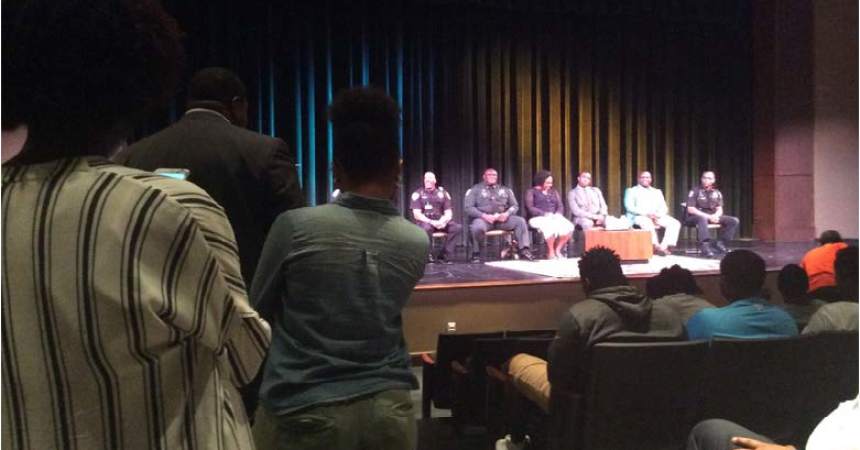
Conversation on racism brings out stories of pain

Members of a recent panel on racism take questions from the audience at Charles Winter Wood Theatre.
Photo by Damon Arnold
By Damon Arnold
Outlook writer
While most of the nation has been engaged in conversation on racial harmony in the wake of police-involved shootings, there have been plenty of opportunities to follow suit in Tallahassee.
One of the most recent events was in a packed Charles Winter Wood Theatre on FAMU’s campus, where several people shared their stories that ring with similarities to what the nation saw two weeks ago.
The country has been rocked with talks of racism following the shooting of Black men by White police officers in Baton Rouge, La., and St. Anthony, Minn. Those shootings were followed by a fatal attack on police officers in Dallas.
The conversation hosted by the College of Social Science, Arts and Humanities and the Division of Student Affairs was led by a panel of police and criminal justice experts and sociologists. Many of their comments drew loud cheers from the crowd, which didn’t hold back expressing their feelings on racism and prejudice.
The crowd was especially attentive when Norman Rollins, a lieutenant with the FAMU Police Department, recalled one of the biggest clash of races in Florida. Rollins was a young boy growing up in South Florida when one of the most violent clashes took place in Liberty City more than four decades ago.
“When I saw dogs being unleashed to attack Blacks in the 60’s, I knew I wanted to be a part of the solution and make a difference,” said Rollins. “We have our opinions of what we see on television, we are police representatives and citizen representatives, as well as Black.
“When I saw the young man get shot in the back while running away from the cops in South Carolina, as a cop and a Black man, that was wrong. I couldn’t make sense of his actions as an officer or as a Black man.”
One of the concerns that parents in the audience had for law enforcement officers on the panel was about how their young male children should respond to being stopped by the police.
In response, Dr. Yolanda K.H. Bogan suggested that parents tell their children to “just get home.”
“I tell my sons to do whatever they have to do to get home to us alive,” said Bogan, an associate dean and professor with the Department of Visual Arts, Humanities and Theatre at FAMU. “It may not feel good, but humble yourself. You know who you are, but right now you have to play this role.”
Georgia Ferrell’s story of her experience of losing a son to police shooting was a poignant moment in the discussion. Her son, Jonathan Ferrell, was killed by police after being involved in a car accident. He was gunned down while seeking help at a nearby house.
“As a mother, I still respect you, I still love you,” said Ferrell, speaking specifically to the law enforcement panelists. “But what do we do about this? I can’t lose another son.”
With that, the room was silent.
“All life is precious,” said Rollins. “And I think officers have to remind themselves of that when placed in a situation that calls for physical action, that all life is precious.”
CORRECTION: It has come to our attention that there is an error in this article.The paragraph and quote that reads:
The crowd was especially attentive when Norman Rollins, a lieutenant with the FAMU Police Department, recalled one of the biggest clash of races in Florida. Rollins was a young boy growing up in South Florida when one of the most violent clashes took place in Liberty City more than four decades ago.
“When I saw dogs being unleashed to attack Blacks in the 60’s, I knew I wanted to be a part of the solution and make a difference,” said Rollins. “We have our opinions of what we see on television, we are police representatives and citizen representatives, as well as Black.
The information and quote should be attributed to Maj. Lonnie Scott, of the Tallahassee Police Department, NOT Lt. Norman Rollins.
The story ran in our paper on July 21st.







